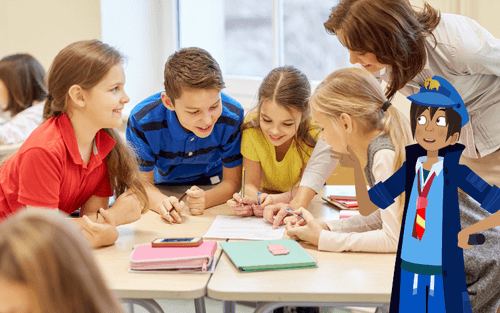6 Fun Reading & Writing Activities For Kids


Looking for reading and writing activities that will keep your child entertained while they learn?
These six fantastically fun reading and writing activities offer a fun way to boost creativity, improve English language skills, and inspire a love of reading and writing in your child!
Creative Writing Time Capsule

Creative Writing Time Capsule is an imaginative and fun way to boost your child’s creative writing skills and encourage self-expression. This activity serves as a time-traveling vessel for your child to express their thoughts, feelings, and to come up creative writing ideas!
How to set up this activity
- Gather materials: collect paper, pens, markers, and a container to serve as the time capsule. You can use a shoebox, a sealed plastic container, or any other suitable option.
- Reflect and write: have your child reflect on their day and write down their thoughts, feelings, and anything that comes to mind.
- Include prompts: provide creative writing prompts if needed to spark their imagination. For example, you can ask them for their highlight of the day, what they learned today, or what their favorite book is at the moment - the possibilities are endless!
- Seal and store: once your child is done writing, seal the paper in the chosen container and label it with the date. This becomes their personal time capsule!
- Open in the future: set a specific time to open the time capsule. It could be a year from now, on a special occasion, or when they reach a particular age. The anticipation of opening their creative writing time capsule makes this writing activity even more fun.
Mad Libs
Mad Libs is an entertaining creative writing exercise that blends reading and writing into an interactive game. This activity is perfect for reluctant writers, as it transforms the writing process into a playful learning experience.
This activity is better suited for older children, or children who already have some creative writing skills.
How to set up this activity
- Gather materials: collect a piece of paper and crayons for each participant.
- Choose a story template: begin by selecting a Mad Libs story template or create one yourself. It should prompt your child to use various parts of speech like nouns, verbs, adjectives, and adverbs.
- Let the fun begin: give your child the Mad Libs template and explain the concept – they should fill in the blanks with words of their choice, turning a simple story into a hilarious or creative text.
- Encourage new words: get your child to use new words and phrases, boosting their vocabulary and writing skills.
- Read aloud: once the blanks are filled, have your child read their Mad Libs creation aloud. This not only boosts reading skills but also brings laughter and joy to the activity.
- Creative coloring: after the reading session, encourage your child to add a creative touch by illustrating their Mad Libs stories with crayons. This adds an extra layer of self-expression to the exercise.
Book Review Rally

Book Review Rally is a fun activity created to inspire a love of reading in young learners, including preschoolers. This effective and interactive approach introduces the concept of expressing opinions and ideas about texts, contributing to children’s critical and analytical thinking skills. Whether you choose an old fairytale or a brand-new adventure story, this activity instills curiosity and prompts children to use their voices.
How to set up this activity
- Pick a book: be sure to choose a text that is age-appropriate. For preschoolers for example, opt for a picture book. For older students, pick more complex texts to keep the activity engaging, challenging, and exciting.
- Read aloud: start by reading the chosen book aloud to your child. Use expressive tones and gestures to captivate their attention.
- Discussion time: introduce the concept of a book review by encouraging your child to express their opinions about the book. This can be done through simple questions like, "did you like the story?" or "what was your favorite part?"
- Create a book review: now that the initial discussion is over, get your child to write a book review. Let them contribute as much or as little as they’d like in an effort to keep this activity as fluid and informal as possible. While book reviews usually follow a specific structure, allow your child to add simple sentences, drawings, diagrams, or whatever else comes to mind.
- Share the review: once your child is done with their book review, get them to read it aloud and share it with you and whoever else is taking part in this fun activity. This will reinforce information retention, reading comprehension, and offer an opportunity to keep the book discussion going!
Letters to Characters
This activity combines letter writing and storytelling, improving literacy skills and boosting creativity while making writing fun! It prompts children to write a letter to their favorite book, show, or movie character with the aim to teach them the letter writing process in a fun and engaging way.
How to set up this activity
- Character connection: get your child to pick a fictional character from a book they’ve read, or a show or movie they’ve watched. As always, make sure that the book, show, or movie is age-appropriate.
- Introduction to letter writing: this writing style can be tricky to master, so before your child starts writing, take them through the different components of a letter. These include the greeting, main body, closing, and sign-off.
- Think about the character: encourage your child to reflect on the chosen character's experiences, personality, and role in the story. This reflection will inform the theme and content of their letter.
- Draft the letter: guide your child through the letter writing process by getting them to start drafting. They should address the character, express their thoughts or questions, and delve into how the character impacted them. If your child is a reluctant writer, they can start by brainstorming some of these aspects.
- Fine-tuning expression: when writing a letter, it’s important to let personal ideas, perspectives, and emotions shine. Encourage your child to infuse their personality into their writing to make it more engaging.
- Sign-off: teach your child how to sign off a letter thoughtfully. Discuss various sign-off options and the impact they can have on the overall tone of the letter.
Story Quest

Story Quest is a fun writing activity created to boost storytelling skills. This is a game that sparks creativity by allowing children to become an active part of the story writing process by providing story starters that they can then build upon.
How to set up this activity
- Gathering supplies: get your paper, pens, pencils, and markers ready and set up a comfortable and cozy writing space for your child.
- Introduce story starters: explain the concept of story starters, which are sentences or phrases that kick-start a narrative and provide them with some short story prompts to get started. Here are some story starters to share with your child:
- Building the narrative: once your child has picked their story starter, get them to brainstorm different parts of the story. Whether it's introducing characters, describing settings, or developing plot twists, they have the creative freedom to shape the narrative!
- Start writing: now that they have a plan, get writing! If your child struggles with writing, get them to tell their story out loud before encouraging them to write it down. You can even record it on your phone or get your child to act it out!
Night Zookeeper

Level up your child’s reading and writing practice with Night Zookeeper!
Our program uses gamification to make reading & writing fantastically fun for children aged six to twelve. There are thousands of award-winning activities and resources available now, from creative writing prompts, to interactive lessons, to free printable worksheets that are sent straight to you.
If you’re looking for a fun way to keep your child engaged and entertained as they learn, Night Zookeeper is the way to go!
Got any questions? Email us at [email protected]. Follow us on social media for more tips and freebies:


Make Reading & Writing Fantastically Fun!
- Award-winning reading & writing program for kids
- Improves spelling, grammar, punctuation & vocabulary
- Over 1,000 different learning games and activities


7 Spectacular Reading Games For Kids


8 Fantastically Fun Writing Games


Why are Reading and Writing Important?


